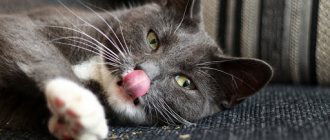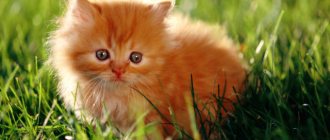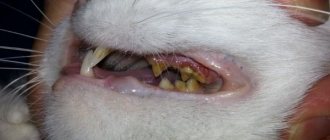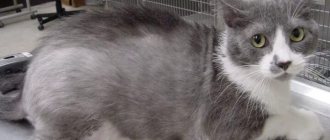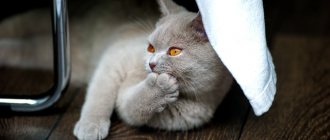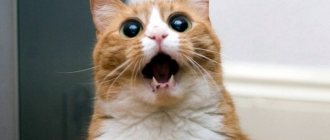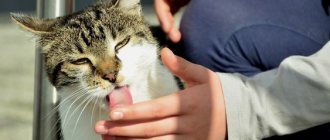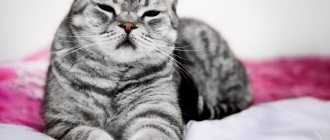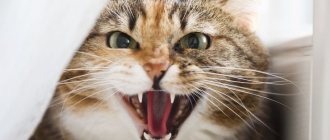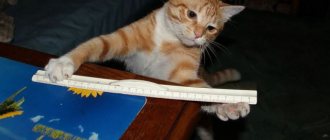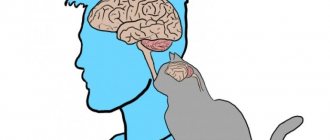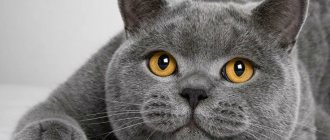It’s hard not to notice how the smell of valerian affects a cat. All you have to do is spill a few drops of herbal tincture on the floor, and some pets begin to behave funny and a little strange. Someone will start rubbing against the stain, someone will sniff, or even taste the spilled liquid. From the outside it may look quite funny. However, purr owners should be extremely careful with such a plant. Why cats love valerian, and whether it is worth allowing them to contact the plant, we will talk later in the article.
Why cats like valerian
Scientists have not yet come to a common explanation why animals love this plant. The interest of cats is due to the composition of the extract. Most researchers believe that animals react to an organic aromatic substance - actinidin. It has a similar odor to the nepetalactone found in catnip. Therefore, representatives of the cat family show a predilection for these plants.
Another theory is that the smell of valerian is associated with 3-mercapto-3-methylbutan-1-ol, a substance found in cat markings. It is found in greater quantities in the urine of males not only of domestic animals, but also of large wild predators: lynx, puma, lion. Therefore, when they come into contact with valerian, they exhibit the same behavior as domestic animals.
Observant pet owners may notice that each cat reacts differently to the same substance. Cats react least to valerian; cats are more inclined to accept it.
Kittens have zero interest in the drug. The fact is that valerian resembles the smell of sex pheromones. They are found in the urine of an animal that is ready to mate. Therefore, castrated individuals and cubs do not show interest in valerian.
There is a genetic predisposition to sensitivity to valerian. Some animals do not react at all to a specific smell, others immediately lose their senses.
The Siamese cat breed is the most resistant to the smell of medicine.
You should not test your pet for sensitivity to valerian, as this may end badly. Individual intolerance may occur.
Why do cats like valerian?
For representatives of the cat breed, valerian is a drug.
Cats that are fed dangerous treats for a long time eventually begin to look like inveterate drug addicts: emaciated and unkempt. The wool loses its shine, the animals lose weight. The period of euphoric excitement is replaced by a deep, long sleep in pets. It has been experimentally proven that valerian can cause severe drug intoxication in a cat, and increasing the dose can be fatal.
Animals can no longer forget the pleasure they receive from the “cat drug” and will again and again beg for the coveted medicine. Among other things, valerian can cause pleasant sexual arousal in them and awaken the sexual instinct.
The herb is also known to relax gastrointestinal spasms, so it is likely that cats periodically require it as a remedy for abdominal pain. This means that in small proportions, valerian can be useful for them.
So, the stage-by-stage reaction of cats to valerian looks like this:
- playful or aggressive agitation;
- long sleep;
- apathy and lethargy.
Scientists have not yet come to a common explanation why animals love this plant. The interest of cats is due to the composition of the extract. Most researchers believe that animals react to an organic aromatic substance - actinidin.
It has a similar odor to the nepetalactone found in catnip. Therefore, representatives of the cat family show a predilection for these plants.
Another theory is that the smell of valerian is associated with 3-mercapto-3-methylbutan-1-ol, a substance found in cat markings. It is found in greater quantities in the urine of males not only of domestic animals, but also of large wild predators: lynx, puma, lion. Therefore, when they come into contact with valerian, they exhibit the same behavior as domestic animals.
Cats and cats love the smell of valerian. They are most attracted to dry rhizomes or fresh grass. A decoction or tincture may also interest your pet, but animals may not approach the poured drops of valerian for a long time, waiting for the alcohol to dissipate. Cats are indifferent to pills, since they have virtually no smell.
Even when mixed with other plant materials, the smell of valerian is very well recognized by animals.
Valerian essential oil contains more than 100 different biological substances. At the same time, only one thing provides a specific reaction of cats to the plant - actinidin. It is this scent that attracts animals. While studying why cats love valerian, scientists found that the smell of actinidin is very similar to the smell of another substance, feline, which is found in cat urine.
It is because of this component that the smell of cat marks lasts so long. Felinin has a very pungent and persistent aroma and, in natural conditions, helps cats mark their territory and scare away foreign males, as well as look for a mate. Felinin is perceived by cats as a pheromone and causes strong sexual arousal in them.
Since the smells of feline and actinidin are very similar, valerian attracts cats so much. Having smelled the aroma, they immediately run to its source and begin to sniff, lick or chew the object from which the smell comes. As a result of the effect of the substance on the nervous system of animals, they produce certain hormones and develop strong arousal.
Valerian does not work on all cats. No more than 70% of pets are sensitive to its smell. Most of all, the plant attracts males of reproductive age and females during estrus. Kittens under one year old are practically indifferent to valerian, since they have not yet fully developed the mechanisms responsible for sexual arousal. But valerian has a full effect on castrated cats.
It is noteworthy that the smell of valerian attracts not only cats, but also their larger brothers living in the wild. However, the plant has a much smaller effect on them, which is explained primarily by the size of the animals and the amount of valerian they can eat. In nature, animals can only find a valerian bush and chew its leaves a little or gnaw on the root. However, they will not eat enough of the plant for it to have the same strong effect on them as it does on domestic cats.
What attracts cats
In addition to essential oils, valerian contains actinidin. This substance is similar to phoromone found in cat urine. It is this that allows you to get a short answer why cats love valerian. This opinion is shared by all modern veterinary specialists.
Contact with the plant provokes changes in the hormonal and emotional status of the pet. He begins to go crazy, a feeling of euphoria arises, similar to a state of alcoholic intoxication in a person. Duration of exposure is from 5 to 8 hours. This is followed by deep sleep, and then lethargy and apathy.
Why do they love the smell of valerian?
The components contained in the plant have a specific smell that attracts cats. Valerian essential oil contains more than 100 components, but the animal is interested in only one substance - actinidin . Its odor is similar to feline, which is found in cat urine. It is because of this biological substance that the aroma from cat marks is very persistent.
In natural conditions, it is not only used to mark territory, but also to search for a mate. According to scientists, felinin acts as a pheromone, causing sexual activity in cats. Animals only like the smell, so they are most attracted to dried grass or its roots . Approach tincture with alcohol only after the alcohol has completely evaporated.
ATTENTION! Valerian extract has an unusual effect in most cases only on cats.
Effect of valerian for cats
The effect of valerian on animals is great. Having noticed or smelled the grass, they try to damage it, roll on it, extract liquid juice and begin to lick it. Then they go into a rage, start rolling on the ground or jumping, meowing loudly, etc.
Kittens and valerian
For your information! Valerian officinalis has a long history. Its root is used in herbal medicine, pharmacology, folk and official medicine. Translated from Latin, the word means “to be healthy, strong.” For cats, the plant is not a medicine. Rather, it causes alcohol or drug intoxication.
The plant was first used as a perfume; it is known that Cleopatra placed its petals around her love bed. Later, noticing that valerian has a sedative, calming, and anticonvulsant effect on humans, it began to be used as a medicine.
Many cases have been described of cats acting wildly if they smelled this grass nearby. However, studies have shown that valerian does not have such a strong effect on all felines. One third of them do not react at all to the herb, the remaining two thirds also vary in sensitivity to valerian. The plant affects the most emotional cats in the following way: they begin to:
- rub your muzzle or nose on a plant or bottle that emits a scent;
- tumble;
- jump;
- shake your head;
- rub against the floor;
- meow heart-rendingly;
- lick fur;
- salivate.
In severe cases, there is a lack of coordination, a hallucination develops, an inadequate reaction, etc.
Even a few drops of valerian causes aggression in animals. It seems to them that they are being attacked, persecuted, so often pets either hide in cramped, dark corners, or behave viciously. They attack the owners, tear furniture and curtains, trying to climb onto the closet or other higher places.
Note! Essentially, valerian is for cats what drugs are for humans.
The composition of valerian roots is quite diverse. It contains alkaloids, esters, tannins, resin, sugar, glucosides, etc. In addition, ethyl alcohol quickly causes alcohol intoxication and addiction. The animals' heartbeat quickens, their blood pressure rises, and after a while they become lethargic and cannot stand on their feet.
Cat alcoholism Therefore, the expression “cat alcoholism” is not an empty phrase.
Animals cannot resist alcohol. As soon as they smell valerian or take a pill, they immediately become drunk, that is, cats “get drunk.” Often, many of them fall into a deep, drunken sleep, which is typical for people. Valerian actinidin is a volatile substance that easily penetrates the animal’s olfactory organs into the circulatory system, overcomes the blood-brain barrier and affects brain receptors, causing:
- Motor excitement: cats roll on the floor, rub their faces, gnaw and scratch the object on which the valerian has fallen.
- Strong sexual arousal.
- Profuse drooling.
- Loss of coordination of movements, disorientation: the cat moves strangely, staggers, misses the bowl, hits its head and body.
- Signs of panic: hiding, flinching, hissing.
- Aggressive behavior.
- Hallucinations: a cat hunts for non-existent prey, attacks an enemy, or flees from him.
- Addiction - frequent stimulation of CNS receptors provokes addiction, like a drug. The cat begins to demand a dose of valerian, actively search for the drug, and meow loudly.
Actinidin, even in small quantities, causes overexcitation and euphoria. This state lasts 20-30 minutes, after which the central nervous system becomes depleted and the cat falls into a deep, many-hour sleep. Moreover, the male will “go crazy” longer than the female.
Some felines may exhibit an atypical reaction to the substance. It all depends on the activity of nervous processes and the excitability of the central nervous system. Certain breeds are less susceptible to the effects of valerian, such as Siamese cats.
Why do cats love valerian?
The question of why cats love valerian so much worries not only pet owners, but also zoologists. Therefore, it has been repeatedly studied by scientists. Studies have shown that the main reason valerian is attractive to cats is its smell. It turns out that the smell of valerian is very similar to the smell of pheromones, which are found in large quantities in the urine of an adult animal. Therefore, cats actively react to the smell of this substance, regardless of its concentration.
Valerian has a stimulating effect on cats. It changes their emotional and hormonal background. The idea is that the smell of someone else's urine should cause aggression in the animal, not delight. But in the case of valerian this is excluded. The substance has an active effect on the central nervous system, which leads to some change in perception. Cats under the influence of valerian become very affectionate, excited and active.
Why do cats love valerian?
Scientists believe that the main reason cats love valerian is actinidin. It is contained in the root of the plant and is addictive to wild predators and cats. For this reason, it is very difficult to drive an animal away from a place that smells of valerian. However, this is not accurate information, because the real reasons have not yet been fully identified. Scientists continue to research this issue.
Why do cats love valerian? There are three main versions explaining the unhealthy love of cats for valerian:
- Addiction. Our pets can also be drug addicts, and the most important drug for them is valerian. With frequent use of the drug, even in small quantities, a strong dependence appears. Many animal owners perceive it as love. Once addicted, the animal will begin to behave inappropriately. It will constantly ask for a new dose, showing aggression or apathy. Treatment for addiction is very labor-intensive and painful for the animal.
- Hormonal explosion. For males, valerian is Viagra. The medicine is very similar to the smell of female hormones. Smelling the smell of valerian, cats think that there is a cat somewhere nearby and try to show themselves in the best light in front of her. All this results in inappropriate behavior and hormonal explosion. Frequent and strong hormonal surges have a bad effect on your pet's health.
- A way to deal with pain. Scientists have concluded that valerian helps cats cope with pain. The animal shows special attention to the drug precisely when it experiences unpleasant sensations. Valerian has a sedative effect and helps quickly relieve pain. If your pet has also shown an unhealthy interest in valerian, then this may be a signal that it is time to take him to the vet.
As you can see, the reason for the love for valerian is not the pleasure of the animal, but quite understandable medical indications. One way or another, only one fact is reliably known - cats adore the smell of valerian.
But how safe is it and how does the substance affect the pet’s body? Let's consider these and other questions in more detail.
Description of medicinal valerian
As long as humanity has existed, it has known about the medicinal properties of valerian. The roots of this plant, which were used by healers of ancient Greece, Rome, Egypt, India, and the Ancient East, are especially valued.
Valerian is the scientific name of the plant and is popularly called cat grass, cat root or mount grass. This is explained simply: its smell is very attractive to cats and has a special effect on them. It belongs to the family of perennial herbs and loves to grow in lowlands, near ponds, and in wetlands.
Visually it looks like this:
- Not only does it have a tall stem, which can reach 2 meters in height, but it is also very thick.
- The flowers are pinkish in color and are collected in an umbrella.
- The root system is loose, short, with many branches.
As soon as cats smell the smell of this plant, they immediately gather near it and begin to roll around in order to damage the integrity of the stem. Then they begin to lick the juice released on the surface of the stem.
Under the influence of the juice, they begin to roll on the ground even more, jump and scream loudly. Valerian has a stimulating effect on them, although people take this remedy, on the contrary, to calm them down.
Is it possible to give an animal valerian and why is it done?
When cats begin puberty, between 7 and 12 months, there is screaming in the house day and night. Estrus is a regular process in the life of any unsterilized cat. During this period, the cat desires a male and experiences physical pain.
Euphoria in cats
Usually this period lasts 2-3 weeks, and in some cats it lasts a whole month. Veterinarians recommend calming your cat using the simplest means. For example, if there is a cat, keep it at home or invite a male for mating. But you need to take into account that she may not like her partner, and she will have to look for another cat, give them time to be with each other.
Note! Even if the first two heats pass without mating, the third and fourth times the cat will have to go through the cat, otherwise illnesses may occur. During this period, many owners give their cats valerian or its solution, keep them warm, and often pet the cats. This brings reassurance, but does not solve the problem.
We suggest you read: Why can’t you feed your cat Whiskas?
Another option is sterilization. Often such cats live 5-10 years longer than unsterilized ones. They don’t go outside, they don’t get dirty, and they have no sex drive.
As you know, valerian comes in the form of tinctures, tablets, capsules, drops, and vitamin supplements. The tincture is also dangerous because it contains alcohol, which has a detrimental effect on four-legged animals, causing them to become dependent on alcohol.
How do valerian tablets work on cats and how many pieces can you give them at one time? This question is often asked by inexperienced cat owners. It turned out that the latter are much more dangerous than the tincture. This is explained by the fact that the tablets contain only one-fourth of valerian itself, the rest are auxiliary substances that can cause severe allergies in cats.
Important! If your pet immediately falls asleep after swallowing the tablets, then it should be taken to a veterinary clinic immediately.
As soon as you drink the medicine, the cats will ask for it again and again. Even if the owner does not give his pet valerian on principle, it may accidentally fall and break. Your four-legged friend will not hesitate to rush and lick this “delicacy”, and they may experience the following symptoms:
- cats lose coordination of movement;
- the limbs do not yield to him, do not serve him;
- the cat falls on its side;
- eyes roll into the forehead;
- strong convulsions run through the body;
- copious foam flows from the mouth.
All of these signs indicate that your pet is overdosing on medication. In such cases, you cannot hesitate; you need to urgently take him to the clinic.
Undoubtedly, the harm that valerian brings to your beloved pets is considerable. However, there are also cases when veterinarians prescribe it to animals as medicine.
Valerian extract treats:
- Thyroid diseases.
- Heart diseases.
- Diseases of the nervous system.
- Diseases of the stomach and intestines.
In this case, the dose must be selected by the doctor.
Important: on the Internet you can find dubious recipes for infusions and decoctions from the root of cat grass, which they offer to give to a sick animal. Do not do this under any circumstances without first consulting your veterinarian.
What happens if you give a cat valerian? By and large, the reaction to such a plant can be unpredictable. In the best case, the purr will simply refuse to come into contact with the unpleasant aroma and move away. If your pet still shows interest in the plant, it is important to understand that valerian is dangerous for a cat.
- Addiction. Like any narcotic or alcoholic substance, valerian for cats is nothing more than an addiction. However, if a person can control his instincts, then it is much more difficult for an animal to do this. Therefore, some cats, having tried valerian for the first time, begin to behave quite aggressively and ask for a new dose. Each time the dose may increase, and the health of the purr may deteriorate significantly.
- Hallucinations. Does a cat under valerian move strangely around the house, stare into space and make shrill sounds? You may think that this condition is similar to alcohol intoxication. However, in some cases this is not the case at all. The fact is that many cats under valerian begin to experience various kinds of hallucinations. And what seems funny to you may be something terrible for your cat.
- Overdose. In the wrong doses, even medicine can become a deadly poison. And in the case of a cat, only a veterinarian can calculate what dose of valerian will be safe. Therefore, carefully ensure that the plant extract (both in tablets and tincture form) is securely closed from your pet’s sight. An overdose of valerian in cats is a dangerous phenomenon that not every veterinarian can prevent. In such situations, your pet may experience convulsions, foam at the mouth, and rapid breathing. In extreme cases, the cat may have a stroke.
- Presence of alcohol. Some owners give their cat a tincture of valerian in alcohol for a laugh. However, pets’ bodies are not designed to drink alcohol. In this case, the liver, stomach and cardiovascular system are destroyed. In addition, alcohol can cause addiction and strange behavior in your purr over time.
Veterinarians practically do not use valerian-based medications in the treatment of cats. There are other drugs that do not have a narcotic effect. You cannot give alcohol tincture to animals, because... it contains ethyl alcohol.
Cats do not have enzymes to utilize it. Therefore, the tincture is too toxic for them and can cause severe poisoning even in small quantities.
Herbal preparations are also prescribed to animals with decreased physical activity and loss of appetite as a tonic medicine. In zoos, valerian grass is laid out in the enclosures of predatory cats in thick canvas bags. They have a moderate stimulating effect and eliminate stereotypical behavior.
But the amount of the drug is determined by a specialist depending on the condition of the animal, body weight, and age. An overdose will cause great harm to the pet’s body, including death.
The aroma of valerian can have the opposite effect on a cat in heat - she will become even more aroused by smelling the male. If you still manage to create the illusion of a cat’s presence by letting the cat smell valerian, the effect will be short-lived and will not solve the problem. It is better to use special veterinary drugs.
This is also true for males. It is impossible to keep a lustful male from trying to break out into the street with the help of the smell of valerian. It is impossible to predict his behavior under the influence of a drug, but it is possible to provoke the development of drug addiction.
Some sources indicate that you can give the animal a little valerian. But before the cat falls peacefully asleep for several hours, the owner will have to wait out the hyperactivity phase.
We invite you to read: What kind of future do cats promise us?
Valerian officinalis contains strong bioactive substances and can be dangerous even to humans. The effect of this drug on the feline body has not been studied, but external manifestations indicate a harmful effect on the nervous system, hormonal levels, and psycho-emotional reactions.
It is difficult to independently calculate the safe dose of the active substance both in pharmaceuticals and natural raw materials. Therefore, there is a high risk of drug overdose.
Veterinarians rarely prescribe valerian as a medicine, because... There are a large number of proven and safe drugs. Medicines based on Schisandra chinensis are used as a tonic.
Veterinary medications have a mild sedative effect, and even with frequent use, there will be no harm to the state of the pet’s nervous system.
Actinidin is the answer to the question why cats love valerian. This chemical component of the medicinal plant has an odor similar to the aroma of the pheromone felinin, which is part of cat urine. In the urine of males there is 4 times more of this substance than in females, so they react to the smell of valerian quite sharply.
The smell of pheromone is sharp and persistent. It is he who helps cats mark their territory so that their other relatives understand it. The aroma causes excitement in animals, which they usually experience during the heat period.
The smell of grass irritates the central nervous system of animals, causing a surge in hormones in the blood. This leads to a change in the behavior of the animal. The cat goes crazy and may start rolling on the floor, meowing loudly, or running around the room. Valerian affects pets in different ways. Some cats fall into euphoria and show joy in every possible way.
In all animals this condition lasts for a short period of time. Then they calm down and fall asleep. Sound sleep after intoxication with valerian in cats can last several hours.
In the wild, felines sometimes chew the stems and roots of medicinal herbs if they feel unwell. The plant has an analgesic effect, which is why it is believed that sometimes an animal is attracted by the smell, which promises to relieve the pain that is bothering it.
Does valerian help during estrus?
Valerian does not calm cats, but excites them. The long sleep that follows is only the result of a natural change in the processes of excitation and inhibition in the central nervous system. Deep sleep is the cat’s body’s reaction to stress and depletion of internal resources caused by the effects of the drug.
If you give a cat valerian to calm it down, in the first half hour its reaction will be the opposite of the desired one - the animal will first “go crazy”, and only then calm down and fall asleep.
If you need to calm your cat down or euthanize him before a long journey, you can buy special products at a veterinary pharmacy. There are many herbal preparations for animals that are practically safe for them. Some remedies also add very small doses of valerian, which in combination with other medicinal substances can contribute to a sedative effect.
It is not recommended to give an animal any drug before vaccination to calm it down without a veterinarian's prescription. Medicinal components may interact, which can be dangerous to the cat’s health.
Sometimes, with the help of valerian, owners try to calm a cat during heat. As already mentioned, it does not have a sedative effect on animals, however, even in these cases it is sometimes effective. Since the aroma of valerian rhizomes resembles the smell of a substance contained in the urine of cats and is perceived by them as a pheromone, the cat can calm down a little thanks to the illusion that there is a cat nearby.
You can only give the cat a sniff of the dry rhizome or its decoction. You should not give your cat valerian. In this case, it will only have an exciting effect. When letting your pet smell the drug, you also need to take into account that it may not calm her down. Some cats, on the contrary, may become even more excited and begin to meow incessantly, calling for the cat. It is best to replace valerian with special sedatives for cats.
Since valerian does not have any long-term effect, it cannot be used to keep an animal at home.
As for cats, trying to wean them from hanging out with the help of valerian is practically useless. If you drop a couple of drops of tincture somewhere, the animal will most likely sniff the object and stay near it for a long time. The very next day, without such a stimulus, the cat may run away again. You can’t give him valerian all the time, as the cat can get used to it and then constantly ask for it. It can also have a bad effect on his well-being and behavior.
The aroma of valerian can have the opposite effect on a cat in heat - she will become even more aroused by smelling the male. If you still manage to create the illusion of a cat’s presence by letting the cat smell valerian, the effect will be short-lived and will not solve the problem. It is better to use special veterinary drugs.
This is also true for males. It is impossible to keep a lustful male from trying to break out into the street with the help of the smell of valerian. It is impossible to predict his behavior under the influence of a drug, but it is possible to provoke the development of drug addiction.
We suggest you familiarize yourself with: Cat silhouette for cutting
When cats begin puberty, between 7 and 12 months, there is screaming in the house day and night. Estrus is a regular process in the life of any unsterilized cat. During this period, the cat desires a male and experiences physical pain.
Euphoria in cats
Usually this period lasts 2-3 weeks, and in some cats it lasts a whole month. Veterinarians recommend calming your cat using the simplest means. For example, if there is a cat, keep it at home or invite a male for mating. But you need to take into account that she may not like her partner, and she will have to look for another cat, give them time to be with each other.
Note! Even if the first two heats pass without mating, the third and fourth times the cat will have to go through the cat, otherwise illnesses may occur. During this period, many owners give their cats valerian or its solution, keep them warm, and often pet the cats. This brings reassurance, but does not solve the problem.
Another option is sterilization. Often such cats live 5-10 years longer than unsterilized ones. They don’t go outside, they don’t get dirty, and they have no sex drive.
The benefits and harms of valerian for cats
According to research by scientists, it is recommended to give valerian officinalis to felines only with the permission of veterinarians. Only a doctor can prescribe the correct dose of medication or combine it with other drugs.
The benefits and harms of valerian
As an adjuvant, valerian for cats is needed only for:
- diseases of some digestive organs;
- some diseases of the cardiovascular system;
- eczema in cats;
- diseases of the nervous system;
- hyperthyroidism;
- aggressive behavior.
Cats may be given this medicine only if prescribed by a veterinarian.
Important! If the life of animals is valuable, you should not use valerian as fun. The veterinarian has the right to prescribe medication if necessary.
How does valerian affect cats if the animals are not controlled? The harmful and dangerous influence of valerian is obvious. It has been observed that the behavior of pets that regularly consume valerian extract changes noticeably:
- they lose weight;
- the fur becomes dull, sparse, dry, and sticks out in clumps;
- behavior and character traits change.
To the question: what will happen if you regularly give a cat valerian, there is only one answer. Cat owners should understand that forcing their animals to drink valerian for fun can cause their pets to die.
Why cats love valerian and why they can’t even smell valerian
So, why do cats love valerian? And do they love her? Maybe it’s not their love for this “drink,” but something else that makes them pull their muzzles towards the treasured bottle to at least sniff it, if they can’t lick it? Let's remember that valerian, well known to all of us, is a tincture of the rhizomes of valerian officinalis in 70% ethyl alcohol. This alone should alert owners, because ethyl alcohol, entering a cat’s body even in small quantities, can negatively affect its nervous system.
Someone might say: “How much alcohol is there!” Yes, the cat will only get a little alcohol, but he’s small himself! His weight is forty, or even fifty to eighty times less than the weight of an adult man. So, when counted, its drops turn into our glasses. But this is only one side of the problem and does not answer the question of why cats love valerian. And they “go crazy” not only if they lick valerian, but even if they just smell it.
Let us remember that the second component of the tincture is the rhizomes of a plant whose name means “health” in Spanish. Indeed, valerian helps with many diseases of the nervous and cardiovascular systems, as well as with gastrointestinal spasms. This is due to the presence of essential oils and alkaloids in the rhizomes of valerian. The components of the oil are bornyl isovalerate, borneol, limonene and others. To the uninitiated, these names will mean little. The initiate knows well that the explosive mixture of chemical elements contained in valerian essential oils adversely affects the very important neurotransmitter systems of the brain, which are responsible for many functions.
The mechanism of their influence is too complex. All we can say is that it is similar to the mechanism of action of cocaine, which is also an alkaloid. A cat is not a person. It is unlikely that she can tell what visions the intake of valerian caused her. Whether she experiences euphoria or not - we can guess by looking at her behavior. Animals often sway on the floor, meow loudly, and cannot coordinate their actions. It is very difficult to talk about the pleasure they experienced at that moment. Especially seeing how the unfortunate cat is not able to stand on its paws, “fit” into a door that is wide open, or reach a bowl of water.
But the fact that valerian is addictive in animals is a scientifically proven fact. Only this fact again does not answer the question of why cats love valerian, and whether they do. In this case, addiction is caused not by the taste of the tincture, but by disturbances in the functioning of the nervous system, which can ultimately lead to schizophrenia and the death of the animal. Here again there is a complete analogy with cocaine. There is hardly a drug addict who will say that he loves the drug because it is incredibly tasty.
Why then is valerian so attractive for cats if it is so harmful? Are animals really so hungry for poison for themselves? It is believed that the smell of the tincture acts on the genes of cats and seals. If this is so, then nothing can be done about it - the call of genes is invincible. Where do the genes call our cats so much that they suddenly turn from quiet and affectionate pets into inadequate ones? And their genes call them to reproduce, or rather, to mate.
Valerian vapor, not to mention drops licked from the table (carelessly spilled by us), cause biochemical processes due to which a certain amount of male hormones are released in the body of males. When this happens naturally, the animal behaves in a similar way, but slightly differently. In any case, he does not fall into a long sleep and stands confidently on his paws, because the cat’s body is fully prepared for reproduction. When the release of hormones is caused by a chemical, the cat suffers more than it enjoys. This can be determined by his gaze, by his desire to stick his head under the stream of water. In a normal state, cats do not have such desires. In some animals, large doses of valerian that entered the body caused nervous shock, vomiting, and irreversible disturbances in perception.
Valerian is also harmful and dangerous for cats. The female body reacts to this substance in approximately the same way as the male body. It has been determined that the chemical composition of valerian and cat urine contains common elements that cause a surge in hormonal disorders in females. That is why they begin to swing on the floor, meow, and are eager to run somewhere.
It turns out that to the question of why cats love valerian, one can answer: “Because it has a stimulating effect on them, similar to the effect of Viagra.” This is confirmed by the fact that in small kittens who have not yet reached puberty, this wonderful drug does not arouse the slightest interest.
But what is curious is that fresh valerian, and not in tincture, can have a healing effect even on cats. Sometimes you can see how they pull out the roots of valerian with their paws, take them out of the ground and eat them. The cats do not experience any madness after this. And they use grass, most likely, when they have stomach problems.
Advantages and disadvantages
Before deciding to use valerian for cats, you need to weigh all the pros and cons of such treatment. Why is this done and is there an alternative? Therefore, if the veterinarian’s verdict on the prescription of such a remedy raises concerns, you should consult with other specialists.
Disadvantages of use:
- valerian is addictive and is a narcotic for cats;
- overdose causes seizures and heart attack. There is a high probability of death;
- a slight increase in the permissible limit can lead to coma;
- After consumption, the animal may experience panic that lasts for several days.
At the same time, valerian does not have a narcotic effect on kittens up to six months. As entertainment, it is permissible to give your animal toys soaked in valerian extract; they will not cause any harm. But giving the root of the plant to domestic cats without a doctor’s testimony is strictly prohibited.
Advantages of use:
- relieves gastrointestinal spasms;
- treats thyroid diseases;
- is an adjuvant in the treatment of cardiovascular and nervous diseases;
- Tinctures of the plant are effective for washing the eyes in the treatment of purulent infections.
Why don't all cats get euphoric?
According to research, 30% of cats do not react to the smell of valerian. An autosomal gene causes an addiction to the plant. Meanwhile, the action of this gene causes a lack of reaction to valerian.
Note! Kittens no more than six weeks old also do not become euphoric from this substance. The fact is that they lack sexual desire, which is stimulated by pheromones, since the hormonal system has not yet formed.
Basically, valerian has a dangerous effect on males, and in cats the smell of pheromones is associated with a rival, with a female smell.
It is known that Siamese cats and British cats practically do not react to the drug. And in some cats it causes fear and disgust. Animals want to go away, to hide in a corner. This mainly depends on the nervous state of the animal.
Do all cats love valerian?
Thanks to the research, scientists were able to find out that not all pet cats react acutely to valerian. Only 30% of cats show an increased interest in the plant; among cats, more than 65% of pets cannot resist the fragrance of the infusion. Before reaching puberty, little fluffies show a complete lack of interest in valerian.
Representatives of the Siamese cat breed are the most indifferent to the smell of “cat grass”.
Veterinarians usually do not recommend testing pets for resistance to valerian. The effect of valerian on the cat's body cannot be predicted. Sometimes grass causes allergies, and sometimes it causes poisoning due to the individual characteristics of the cat’s body, which rejects certain plant components.
How to please your pet without endangering health
Catnip has a similar effect on cats. This is a herbaceous plant that contains aromatic essential oils, as well as the substance nepetaloctone. It is this component that acts on cats as a powerful pathogen. Even the most sedentary couch potato turns into a perky and jumping ball of energy.
Moreover, the effect occurs without direct use, as with valerian. It is enough for a cat to catch a subtle aroma to feel extreme excitement. Among the reactions: meowing, purring, and even growling. Sometimes hyperactivity appears. The pet begins to run and jump. Rarely, but attacks of aggression do occur.
The mild effect of catnip is due to its short-lasting effect – about 10 minutes. After this period, the animal completely returns to its normal state. And the smell of the plant will begin to bother him no earlier than after 2 hours. Therefore, there cannot be an overdose, as such, in the case of mint.
Scientists studying such reactions suggest that the plant’s effect is based on imitation of the “happiness hormone.” This stimulates the brain receptors, and the cat at this moment feels euphoria and unprecedented energy.
But if your pet decides to eat deliciously smelling mint, you will get the exact opposite effect. He will fall asleep sweetly, or become quiet and calm, since when it enters the body the plant has a sedative effect.
Interesting!
The reaction to catnip is determined by the presence of a specific gene. Thus, cats that do not respond to this plant will produce equally unresponsive offspring.
Pampering your pet with mint is possible, and sometimes even useful. But it is worth considering that essential oils fade over time. When keeping such a pathogen at home, it should be stored in an airtight container.
How does valerian affect cats?
Extracts from valerian root are used by humans as a sedative and antispasmodic. It relieves nervous tension, fights anxiety, insomnia, high blood pressure and much more. It contains more than 100 compounds and it is still not known exactly which of them gives a therapeutic effect. But this is for people. Valerian produces at least an unusual effect on cats, both domestic and wild. It does not calm, but excites cats. Actinidin acts as a stimulant in cats.
Cats after valerian: changes in behavior
If the gene does not mutate in a cat’s body, then the smell of valerian causes euphoria in him and affects the nervous system of males, as it is similar to the smell of pheromones in the urine of females. A strong sexual instinct awakens in the males, and the cats begin to hunt.
Changes in behavior in cats
Typically, the symptoms of a cat under the influence of drugs or alcohol are as follows:
- they purr loudly;
- rubbing their head on the floor and other objects;
- meow loudly;
- running around the house.
Then comes the relaxation phase:
- cats become uninitiative;
- huddle in a corner, hide under the bed;
- falls asleep quickly.
In this state, animals should get as much sleep as necessary. You shouldn’t wake them up, and they won’t wake up voluntarily. The next day, the pet will forget about the drink and will again become a cute kitten. This is what happens if you give a cat valerian.
Everyone knows that a cat and valerian are incompatible concepts; it acts on pets like alcohol or a drug. Zoologists say that valerian and a cat are the same as cocaine and a person. Scientists say that the animal will experience a state of euphoria, hallucinations, and a lack of coordination.
Sometimes pets are unable to stay on their feet, sway in different directions, do not fit into the doorway, roll on the floor, they either attack an invisible target or flee from a non-existent enemy. During all these actions, they scream loudly and do not get their bowl - naturally, valerian is harmful to their health.
If you periodically allow the use of valerian, which is harmful to the cat, then you can subsequently end up with a degraded animal, with completely forgotten skills, with ignorance of its bowl, tray and even owner. His hair will begin to fall out, baldness will begin, and signs of depression will appear.
If the pet, after strong excitement and euphoria, sleeps soundly, then it is necessary to urgently take it to the clinic.
We invite you to read: Endometritis in cats - symptoms, diagnosis, treatment. Purulent, postpartum endometritis in cats
Features of the impact
Those who have pampered their furry friend with valerian at least once may have noticed an unusual reaction. And although it manifests itself differently in everyone, we can conditionally divide the behavioral characteristics of animals into characteristic groups:
- Indifference . In fact, the stereotype that all cats go crazy because of the smell of medicine does not entirely reflect reality. Scientists have found that a violent reaction occurs in only 70% of animals. The remaining 30% do not pay any attention to the “magic drops”. This third of the total often includes kittens under 12 months of age and neutered animals.
- Euphoria . This is exactly the word that can describe the state of a purr, licked with valerian. The cat's behavior resembles that of a person under the influence of alcohol. The animal may stagger or lie, looking at one point with glassy eyes. Later, the cat falls into a sound sleep. And after waking up, he will return to the place where he was given the medicine and will try to find it again.
- Wild insanity. It is rare, but it happens that an animal rushes around the house, tears up wallpaper and climbs up curtains in a frenzied fit. The loud yelling that accompanies all this madness naturally frightens the owners. This is practically a cat's delirium tremens, which deals a big blow to his nervous system.
- Apathy and relaxation . Some cats fall asleep immediately after trying valerian. Although, in fact, this behavior is not due to this particular substance, but to the alcohol contained in liquid formulations. More often than not, cats wait until it wears off, but it happens that they still lick off a small dose. It is alcohol that causes the animal to become addicted to the medicinal tincture.
- Hallucination . In exceptional cases, the cat begins to feel that someone is threatening its health. Therefore, they can fight an invisible enemy, hiss and rush into the void. In addition, people and objects in the house are perceived by them as unfamiliar.
Read:
Why do bedbugs appear in an apartment: folk signs
Which is better: drops or tablets
Some cat owners think that they can give valerian in solid form and it will not be harmful to the animal. However, this is not true, the tablets are no less dangerous for cats to consume, because they contain no more than 2% valerian, everything else is auxiliary substances that can cause a severe allergic reaction.
The medicine is available in 2 dosage forms: in the form of an alcohol tincture and film-coated tablets. Valerian in both forms is harmful to pets. The drops contain at least 65% ethyl alcohol, and the tablets consist of 75% synthetic fillers.
Valerian tablets are much more dangerous compared to drops.
The fact is that one tablet contains only a quarter of this drug, and the rest of the contents are synthetic excipients that can cause a severe allergic reaction.
If an inexperienced owner gave the cat one tablet, after which the animal fell into a sound sleep, it is necessary to urgently take him to the veterinarian.
It is these factors that explain the negative attitude of veterinarians to such jokes from owners of furry pets. So, is valerian harmful for cats? Too much infusion can even kill the unfortunate animal, plunging it into a state of sleep from which there is no awakening!
Is it possible to give herbal medications?
Since valerian causes drug addiction in cats, it should not be given to animals without a doctor’s permission. If you want to please your pet, you can buy catnip. This grass is often stuffed into the insides of cat toys. You can also buy some dried mint and make a toy for your pet yourself. Such substitutes have a gentler effect on the nervous system of cats. After 15 min. the animals will forget about her.
To avoid trouble, every owner of felines should be aware of the effect of this medicine on four-legged animals. It can be given with the permission of a veterinarian without exceeding the dosage. Otherwise, serious health problems for cats will arise, which can lead to the death of the animals.
What is valerian
Valerian, popularly nicknamed “cat grass,” is actively used by people in the form of a medicinal infusion, which has a calming effect on the nervous system, improves heart function, normalizing its rhythm. In addition, it is taken as a mild sleeping pill.
Unlike a person, a cat, having inhaled the smell of valerian, begins to behave strangely. First of all, you can notice the dilation of the pupils, indicating genuine interest. The sleeping musk instantly awakens from sleep, and lustfully inhaling the vapors, searches for the object of passion. Having received its dose of tincture, the cat plunges into euphoria, rolling on the floor and purring with delight. Sometimes the drug can cause severe hallucinogenic sleep, aggression or panic in an animal.
In tablets
There may be times when your cat needs to be taken to the veterinarian, but the thought of traveling halfway across town with an angry animal in your bag makes you nervous. Valerian (only in tablets) can do a good job here too. Take a couple of tablets yourself and treat one or two to your pet. After he's had a blast, he'll calm down and fall asleep for a long time, and you'll be able to take him for a routine check-up without incident.
The harm from tablets is not as great as from tincture, so you can use this remedy once or twice a year without remorse.
If you want to cheer up a sad pet or relieve stress after an unpleasant visit to the doctor, it is better to use a product that is safe for animals - catnip. This plant is not addictive; no negative side effects have ever been observed when taking it. And, most importantly, it is completely harmless to your pet’s body.
Catnip is available both fresh and dried. You can buy a toy for your pet that is soaked in the extract of this plant. There will be no limit to joy!
How do cats react to an overdose?
There have been cases of death in cats due to an overdose of valerian pharmaceutical preparations. Once an animal eats 2-3 tablets or chews a large root of a plant, only emergency veterinary help can save it from death.
Pet owners do not always realize the consequences of their actions. They often find the cat's reaction to valerian amusing and therefore regularly give it to the pet.
Uncontrolled access to the drug leads to overdose. The animal becomes seriously intoxicated and requires treatment from a veterinarian. Do not delay contacting a doctor, as your pet’s life is at risk.
Symptoms of overdose include loss of coordination, foaming at the mouth, seizures, and rolling of the eyes. In the absence of qualified assistance, the animal will die from poisoning.
Not only valerian tincture is dangerous, but also pills. They contain only one part of valerian, the rest are synthetic substances. Even one tablet can cause an allergic reaction.
In severe cases, the animal falls asleep. In this case, urgent assistance from a veterinarian is required.
Tinctures contain alcohol, which also negatively affects the body and causes poisoning. As a result, it leads to liver problems. Characteristic symptoms include slow breathing, vomiting, weight loss and frequent urination. If these signs occur, you should immediately take the animal to the veterinarian.
Weight loss
- lack of coordination;
- numbness of the limbs;
- eye rolling;
- convulsions;
- foaming from the mouth;
- loss of consciousness.
If such symptoms appear, it is necessary to urgently take the animal to a veterinary clinic. Valerian poisoning can be fatal and requires complex resuscitation measures.
There is an opinion that valerian in tablets does not have such a harmful effect on animals. Sometimes owners, without much fear, treat their pets with odorous pills only because they smelled the smell and began to insistently ask.
In fact, in tablet form the drug has no less powerful effects. In addition, it contains auxiliary components that can cause allergies in the animal. If you need to calm your pet, it is better to offer him a special cat sedative. It is also advisable to consult a veterinarian before doing this.
There are cases when a cat independently reached valerian by eating a whole package of tablets or drinking a bottle of alcohol tincture. As a result, an overdose of the drug occurs, which requires immediate intervention by a veterinarian.
In this case, the animal's life is at risk.
Signs of overdose:
- white foam comes from the mouth;
- convulsions in a cat;
- the cat fell on its side;
- eyes roll.
Therefore, the use of valerian is justified only as directed and under the supervision of a veterinarian, since each animal tolerates this medicine differently. So, protect the health of your furry pet from stupid experiments. After all, short-term fun can end very tragically - even death.
As soon as your pet gets to the package of tablets or tincture, he, without knowing the measures, will destroy it all in an instant. In this case, an overdose of the drug occurs, and this cannot be done without the intervention of a veterinarian, otherwise the animal’s life will be at risk.
Signs of an overdose include the following:
- the cat constantly falls on its side;
- she is seized by convulsions;
- white foam coming from the mouth;
- eyes roll involuntarily.
What's so special about valerian?
It turns out that in addition to essential oils that are beneficial to humans, the plant contains actinidin. This substance is a pheromone similar to the substance found in the urine of domestic and wild cats. Exactly this one
Scientists and veterinary experts consider this chemical component to be the main reason why cats love valerian.
Upon contact with the plant or tincture of the drug, the emotional and hormonal status of the cat’s body changes. The animal falls into a state of euphoria, reminiscent of alcohol or drug intoxication in humans.
The pet can remain in this state for several hours. This is why cats like valerian, they are simply intoxicated by it.
A pheromone-like substance causes stimulation of the central nervous system in pets, similar to the state during sexual heat. Animals become agitated, sometimes even aggressive and completely uncontrollable. They can attack household members and bite.
It should be noted that this chemical is not only found in valerian. A plant such as catnip also contains a similar pheromone and has an equally strong effect on the body of cats.
We recommend reading about how to clean your cat's ears at home. You will learn how to gradually accustom your cat to cleaning his ears, the necessary materials for this, and why ear hygiene is so important. And here is more information about how to accustom a cat to a scratching post.
In tincture
According to some scientists, cats are attracted to the 70% alcohol contained in valerian tincture. Drinking alcohol is unlikely to bring any benefit to the animal, but it causes great harm: even a single dose of alcohol can cause severe dependence, comparable to a drug addiction. Once you try valerian tincture, your pet will ask for it again and again or try to get the coveted bottle on his own.
It also happens: the bottle fell out of your hands and broke, or the tincture accidentally spilled on the floor. Your cat is right there, licking all 50 ml clean, before you even have time to gasp. Following this, the following may occur:
- The animal will stop coordinating its movements;
- His limbs refuse to serve him;
- He falls sideways;
- The eyes roll under the forehead;
- Strong convulsions run through the body;
- Copious foam flows from the partly open mouth.
These ominous symptoms are signs of an overdose. Don't wait for your pet's condition to change for the better: immediately put him in a carrier and take him to the veterinary clinic as soon as possible, otherwise you risk losing him.
However, in some cases, this drug can become your reliable assistant: for example, when an animal needs to be toilet trained.
We suggest you read: Injuries of the spine and spinal cord in dogs and cats: choice of treatment method
Sometimes owners fail to teach an already quite adult pet to use the litter box. He can do his business anywhere, just not where he is supposed to. In this case, valerian can help.
Wash the floor thoroughly using special preparations that eliminate the smell of cat urine and excrement, then lightly sprinkle it with valerian drops. The intense aroma of the medicine will prevent the animal from using the floor for other purposes.
